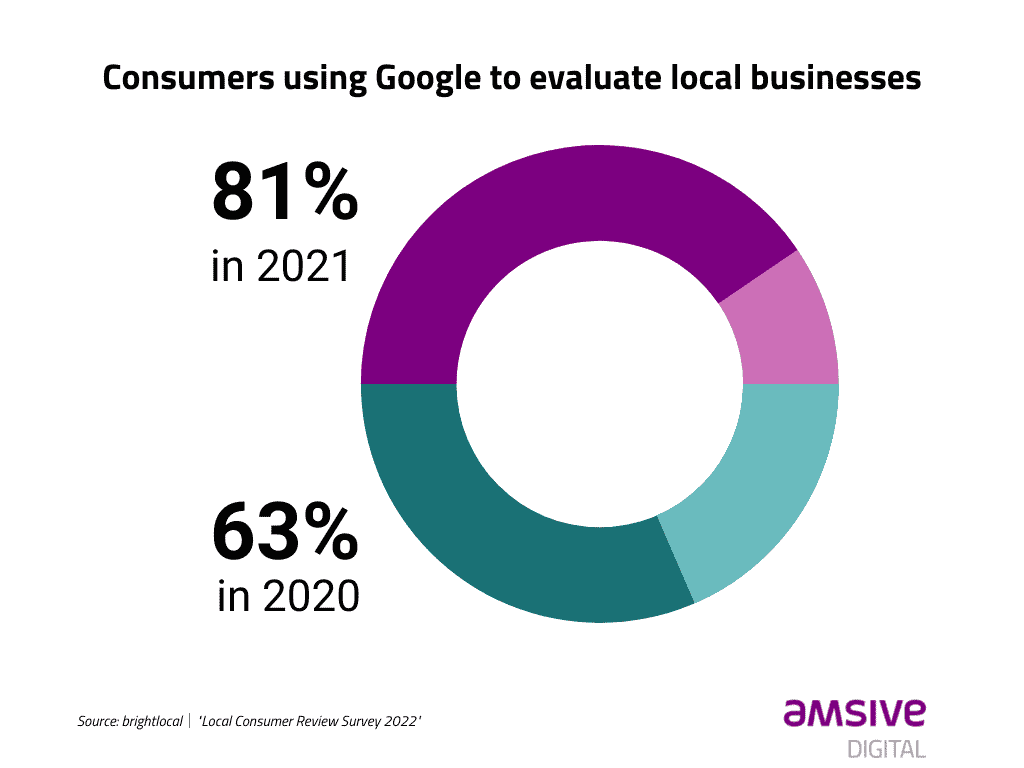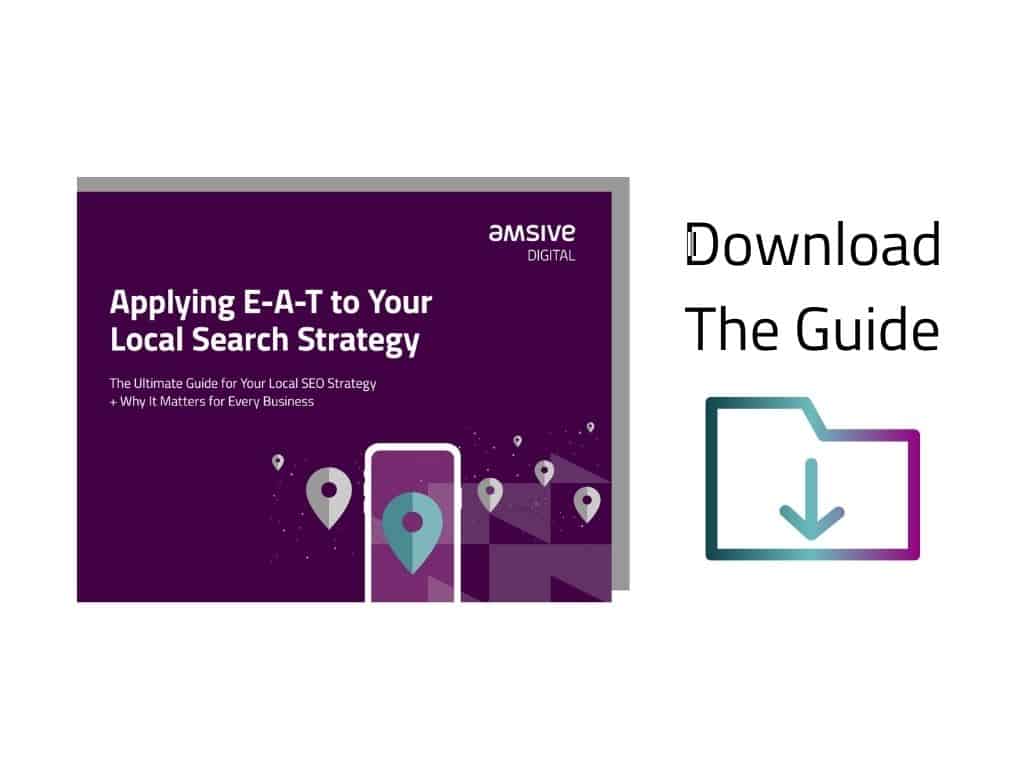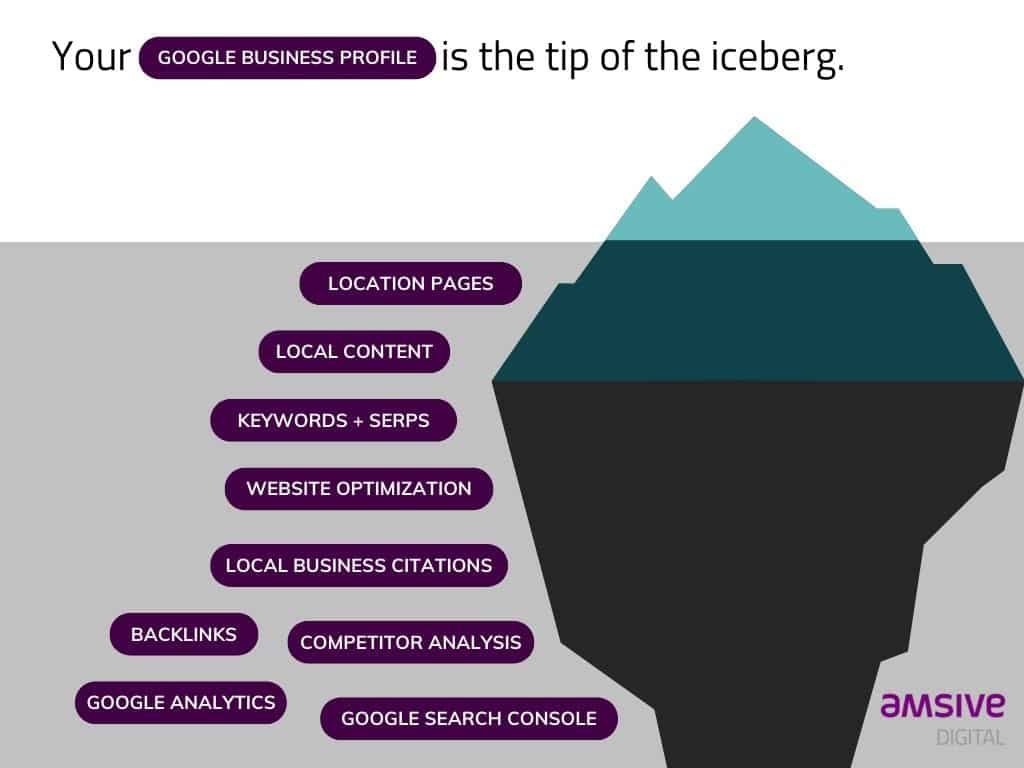Brick and mortar businesses need local SEO. As customers look for answers, products, and services online, learn how your organic local search presence should be there to greet them.
While storefronts may be worried about your signage standing out in the strip mall, many more people are walking past your digital front door each day. Accurate, verified, comprehensive information about your store locations should greet them, brimming with recent reviews, helpful additional content, and more. Wrangling and improving local search results is tricky enough for one storefront. What if your business has 100 locations? Start in the same place. Understand the current condition of your local search presence, and then make a plan.
Jump to: What’s a Google Business Profile? | Your Google Business Profile + E-A-T | Keywords + SERPs | Website | Local Business Citations | Local Content + Location Pages | Google Search Console | Backlinks | Competitor Analysis
Your business, whether it has one or one hundred locations, needs to be visible to people searching locally.
In 2022, there’s no way around it: your local search presence impacts your business. Whether local SEO strategy has been on your radar or not, it’s time to prioritize this tool that can power up your business with more traffic, leads, and, ultimately, customers. Learn the value of local search and how to simplify your auditing process. So, instead of letting your local search presence sit around, let search engines work for you — bringing more traffic, better customer experiences, and sustainable business growth.

What’s a Google Business Profile?
Your Google Business Profile (GBP) is a free tool from Google that allows you to take charge of the way your business appears on Google Search and Maps. A verified, complete, and optimized GBP benefits every business that has one or one hundred brick-and-mortar stores. If your store has a front door, it’s necessary to also provide an accessible and compelling digital front door, too, as more and more of your customers search for your business and its products and services online.
With your GBP, you can connect with customers, post updates, list your products and services, accept online orders, and more. Without a verified and optimized GBP, it can be challenging to utilize all the opportunities Google provides to support a business’s offerings and visibility, ultimately impacting how many people can find your business online and your search rankings.
GBP optimization includes improving all of the appropriate signals Google uses to rank for local intent-based searches, including:
- NAP: Accurate name, addresses, and phone numbers across all business sites
- Services: Accurate information that provides consumers with what they need to make informed decisions
- Reviews: Reviews play a prominent role in ranking businesses favorably; we work with client teams to engage with your customers and earn high-quality reviews
- Highlights and Attributes: This section is an opportunity to share the many facets of your business that make it unique, including its specialty, amenities, and conveniences
Your Google Business Profile + E-A-T
With Google’s prioritization of expertise, authority, and trustworthiness (E-A-T), the information compiled within your business’s GBP is one of the best ways to increase visibility in organic search. Google uses your GBP and your website to better understand your services and gather information about what your business provides. A verified and optimized Google Business Profile adds a giant heap of E-A-T to your business’s digital presence.

Google Business Profile Verification
Verifying your business’s GBP should be as simple as receiving a postcard from Google with a unique verification code in the mail. But unfortunately, that’s not always the case. While the business verification process is meant to be quick and easy, various factors can draw out your verification for months or even longer. From postcards that don’t arrive to navigating video verification, there are many steps to take — for each and every business location — in order to troubleshoot and eventually be verified. For one storefront, it’s an annoyance. If you have 20 or 200 locations, it’s a challenge. If you have more than 10 locations, verifying more than one location at a time through bulk verification offers a way through this process.
Google Business Profile Reviews
Reviews are a Google Search ranking factor. Profiles with more reviews with better star ratings have improved ranking in search results. Local customers have the opportunity and are increasingly willing to write reviews that appear on your GBP. These reviews are available for all searchers to find and play a significant role in determining visibility in the local Google Maps results, too.
Interested in your business’s reviews? Google “your business name” and “reviews,” and you’ll be able to see what you’re already working with. There are several ways to manage your reviews and increase the number of high-quality reviews for your business location. Managing your reviews in GBP with thoughtful, unique responses should be the first step. While responding to reviews isn’t necessarily a ranking factor it is indeed a trust signal that can influence click-through rates.
While there’s much to optimize and improve within your Google Business Profile, it’s just one key piece within your local search presence.

Keywords + SERPs
In SEO, a keyword is a word or phrase that defines what your content is about. Local SEO focuses on keywords with local intent — when searchers are only looking for local services.
Local keywords searches could include:
- “plumber scranton”: A person needing to fix the bathroom in their business
- “san diego bank”: A person new to town and needs to complete a bank transaction
- “mortgage lenders near me”: A person researching mortgage options to make a financial decision
Local keyword research can help you understand which keywords your business should prioritize ranking for. A current audit of keywords and ranking in the search engine results pages (SERPs) helps you:
- Identify keywords that have established authority and can gain momentum
- Sort and disregard keywords you shouldn’t be spending time and effort on
Once you know where to focus your keyword efforts and what keywords to ignore, your local SEO strategy can start to fall into place. SEO is a long-term strategy, so no keyword should be equivocally dismissed. However, it’s best to focus on those keywords you realistically have a chance to rank and drive traffic for. People don’t always search the same way online. Don’t limit your research to single keywords, but rather account for the many words and phrases your audience could use to try to find your business or offerings.
Local SEO research should include learning:
- How people search geographically throughout cities and states
- Keyword triggers by region and location
- Keyword planning for search by city and other competitive insights
Local keyword research and understanding your place in the SERPs help establish a strong foundation that informs other aspects of your local SEO strategy.
Website
With keyword data in hand, you’re ready to conduct a full keyword and technical website audit to ensure your site is optimized for three things:
- Crawlability: the ability for search engines to “crawl” or find, read, and follow the links on your website
- Indexability: the ability for search engines to show your web pages in their search results
- Visibility: how visible your web pages are in search engines’ organic search results
A website audit is designed to analyze the underlying structure, content, and overall site experience. An audit looks at:
- On-site optimization for alt text, title tags, headings, meta descriptions, and more
- The quality of internal linking and external links pointing to the site
- Schema
- Mobile-friendliness
- Content
- And more
What is schema?
Schema plays an important role in local SEO. Schema is a vocabulary of microdata or tags that you can code into your website to help search engines read and represent your page in the SERPs. The local business schema type includes important and relevant information such as addresses, reviews, hours of operation, social media accounts, service area geo-shapes, and departments in your code that may not necessarily live in your on-page content. Schema is a great way to tell search engines all about your business without having to write every single detail onto your web pages, and just one way that SEO and your website work together.
Your GBP and your website are like siblings — they should complement one another, use the same keywords, and share identical information. This allows Google to provide the best user experience to users searching for your business.
Local Business Citations
Citations are online listings for local businesses featuring their name, address, phone number (NAP), and other key information. Well-known citation sites include Yelp, Yellowpages, Bing Places, Apple Maps, Yahoo’s Localworks, and more. Business citations are considered a ranking factor for local SEO visibility, and the quantity, quality, and accuracy of your business listings can affect how Google’s perception of your business.
In order to be found online and rank well in the search results, your business information must be consistent across the entire local search ecosystem. Additionally, your business needs a presence in reputable local directories, review sites, business directors, or local partner sites.
Local Content + Location Pages
High-quality content on your location pages and beyond adds critical E-A-T (expertise, authority, and trustworthiness) that can impact your overall search rankings. A content audit asks: what is your ideal local customer searching for online? And what’s the intent behind their search?
This could include:
- What’s generally available in their area
- Recent reviews of competing businesses
- Looking to visit a location right now
- Finding a provider to come to them or have a product delivered
Getting into the mind of your ideal customer helps you determine content gaps that need to be filled in order to rank better in local searches — and ultimately be seen by the right people.
Location pages, also commonly called service area pages or location landing pages, can be specifically designed to target a certain keyword in a specific area. Additional content on location pages includes specific details such as landmarks, driving directions, and which services are available in which area. To optimize your location page, the more clear, well-established, and comprehensive, the better the user experience for your customer and rich information for search engines, too.
Other local content, such as blogs with locally specific information, also offer supplementary opportunities to improve E-A-T and develop high-quality content. What’s high-quality content for consumers? The content they want to consume, like, or share. With the rise of video and motion graphics, consider experimenting beyond just static text and images to share about your brand. Make it easy for people to share your local content by including visible share buttons, a simple best practice. Social signals, your social media visibility as perceived by search engines, are not search ranking factors. Sharing content on social has a higher chance of being linked, which can in turn positively affect your site’s authority and organic visibility.
Google Search Console
Understanding the full picture of your site’s traffic and performance develops your local search strategy. Find out what’s working, what isn’t, and where you need to improve within Search Console. Data related to keyword and content performance, indexing, schema, and rich results validation, mobile and desktop experience monitoring, security and manual actions, and much more are housed within this tool. Pay particular attention to any issues related to pages not being crawled or indexed or any manual actions having been taken based on questionable practices, as both can have a detrimental effect on search engine visibility.
Google Analytics
Uncover key insights to better inform your local search strategy through tracking and reporting on your website traffic through Google Analytics, a web analytics platform. Google Analytics data is useful to validate content performance, traffic sources, audience profiles, and paths to purchase. There have been recent changes to Google Analytics as it sunsets Universal Analytics and launches Google Analytics 4.
Backlinks
A backlink, similar to a citation, is, in essence, any link to your website from another website. Links remain an important factor in determining a website’s authority, within E-A-T, of a website, lending validity if they come from relevant, reputable sources. A backlink audit should generally happen every six to 12 months. This ensures there aren’t non-reputable or irrelevant links to your local business. Depending on the source, nature of the link, and the content it links to, it may be necessary to inquire about having the link removed.
Competitor Analysis
To be the best, you need to know the strengths and weaknesses of your competitors. It’s no different with your local SEO strategy. Begin by confirming which specific businesses appear in the search results when entering your target keywords. These businesses are your true competitors and the sites to review and learn from. What does this site have that yours is missing? How can you improve your content to go beyond what competitors are providing? In general, the best way to outperform your competition is to provide a better overall experience online and off, which includes generating more relevant, high-quality content to address the questions your mutual customers have.
Learn more about local SEO
Many businesses still aren’t focused on their main traffic source, their digital front door. Your business’s results and ranking in local search results impact your customer experience and bottom line. Whether you have one or one hundred locations, the online information across the local search ecosystem must be accurate, consistent, and comprehensive to rank well. And your Google Business Profile needs to be verified to even be seen at all. Google your business name on your phone. How welcoming is your digital front door to customers searching right now?
We can help you develop a local search strategy, verify your Google Business Profile, optimize your local search presence, and everything in between.
Want to learn more about local SEO? Here’s a great place to start: Applying E-A-T to Your Local Search Strategy






